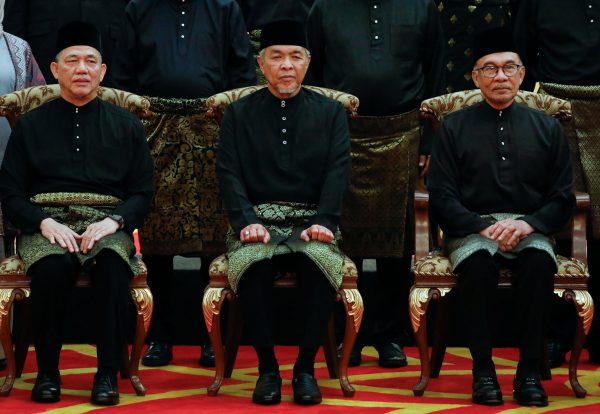UMNO’s old guard — headed by party president Ahmad Zahid Hamidi — were sure they would win when pushing for an early general election in 2022. UMNO had triumphed before in a series of state assemblies and by-elections. The old guard brimmed with victory confidence. Zahid also tightened his hold over UMNO, purging party leaders and aspiring candidates who opposed him. He aimed to shake off the deadweight of irksome coalition partners and factions.
In the grip of its old guard, UMNO began campaigning. It hoped to win big and reinstitute the single-party dominance that it had exerted for so long. The old guard recalled UMNO’s fusion with the state bureaucracy, made manifest in a party-state, enabling its members to amass vast patronage. Over time, this had grown into the main purpose for UMNO’s very existence.
But the confidence displayed by UMNO’s old guard turned out to be the false confidence of dictators. Rather than gracing UMNO with victory, the 2022 general election marked the party’s worst-ever electoral showing, with Malay–Muslim voters fleeing to more ‘authentic’ protectors, especially the Malaysian Islamic Party (PAS). UMNO should have seen this coming. The comparative evidence shows that in only one country case — the Sandinista National Liberation Front in Nicaragua — has a former single-dominant party managed to reinstitute its dominance through authoritarian regression.
With UMNO’s hopes blighted, Zahid was confronted by rivals who demanded he bow out. Some also called for UMNO to adopt a fresh look, refashioning itself as a vehicle for reform. But Zahid and the old guard were unmoved. Even so, a week after the 2022 general election produced a hung parliament, Zahid leveraged UMNO’s parliamentary bloc to combine with a beckoning Pakatan. Even if ranked second, UMNO was restored to power through the new ruling coalition.
Zahid then returned to insulating his own position and promoting his allies. Prior to UMNO’s March 2023 internal party election, he had won approval from his party for his presidential post to go uncontested. When the election took place, Zahid’s hand was strengthened further, with his allies winning two of the party’s three vice-presidencies and most of its Supreme Council posts. He duly rewarded them with lucrative directorships on the boards of government-linked corporations — Malaysia’s own giant squid-like predators.
In order more fully revive UMNO’s old guard, Zahid and his party’s Supreme Council have applied for a pardon for the former UMNO president and prime minister, Najib Razak, who is now six months into a 12-year sentence for embezzlement from a subsidiary unit tied to 1Malaysia Development Berhad (1MDB).
UMNO’s demand for Najib’s pardon is profoundly unsettling to Pakatan’s leader and Prime Minister, Anwar Ibrahim. Pakatan, unable to resonate with the Malay–Muslim electorate over Islam and ‘race’, tries to appeal through democratic reform and good governance. To coalesce with UMNO weakens its case. For UMNO now to seek absolution for Najib, once ‘Malaysia’s biggest warlord’, makes this even harder.
The pardon process is complex. Anwar finds himself advising the Pardons Board on a committee alongside Malaysia’s king. With Najib having had a hand in Anwar’s jailing on charges of sexual abuse, personal enmity is likely deep, even if Anwar denies this.
There are doubts over the substance of a pardon — the dissenting opinion in the Federal Court’s decision to uphold Najib’s conviction seems wrong in law. It may also by blocked while Najib’s 1MDB cases are underway or upcoming. UMNO’s demand for Najib’s pardon places great strain on relations within the ruling coalition and the functioning of the country’s judiciary.
More trouble lies ahead. It is not only UMNO that acts as if it were business as usual. Pakatan is also dragging its feet over the reforms that it had promised.
To strengthen civil liberties, Pakatan declared it would repeal the onerous Printing Presses and Publications Act. Yet its Home Minister, Saifuddin Nasution, now intones that the act is still needed. The Sedition Act, the Official Secrets Act, the Communications and Multimedia Act and other draconian laws are less readily invoked today but remain on the books and in use. Meanwhile, Minister in the Prime Minister’s Department, Azalina Othman, seems keener to pursue UMNO’s vendetta against Tommy Thomas, the former attorney general whose office had bought charges against Najib.
While Pakatan, UMNO and other sub-alliances attached to them may achieve little reform, avoiding change and the clashing that it would spark will enable the ruling coalition to escape the schisms and defections that would spell its demise.
This may cost them the next election, as many Malay-Muslim voters flee to the seemingly more pious PAS. But meanwhile, Pakatan and UMNO, in their marriage of convenience, bring respite to Malaysia’s frenzied political life — an accomplishment in itself. This pause will linger even if Najib is sprung.
William Case is Professor and Head of the School of Politics, History and International Relations at the University of Nottingham Malaysia.

